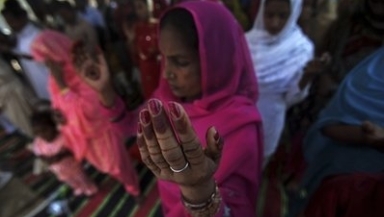
A Pakistani Christian who has been convicted of blasphemy and sentenced to death is launching an appeal to the Lahore High Court.
Sawan Masih, a 26-year-old father of three, has been in jail for his alleged crime since March 2013. His sentence also requires him to pay a fine of 200,000 Pakistani rupees (£1,229).
He was accused of saying: "Jesus is true, he is the Son of the God. He will come to save me, while the Muslims' Prophet is fake," while arguing with a Muslim friend in the Joseph Colony neighbourhood of Lahore, an area mostly populated by Christians.
In Pakistan, where 97 per cent of the population are Muslims, blasphemy laws are taken very seriously and accusations are often thoroughly investigated. However, there are many reports of the laws being used for personal score settling, and they are disproportionately used to prosecute minorities.
When news of the accusations against Mr Masih first surfaced, 3,000 people attacked Joseph Colony, burning down the homes of at least 178 Christians. Two churches and dozens of Bibles were also destroyed.
The Centre for Legal Aid, Assistance and Settlement (CLAAS), an organisation that works to protect Christians who are persecuted for their faith in Pakistan, launched the appeal two days after the initial sentencing.
Mr Masih's lawyer, Naeem Shakir, told AFP that circumstances surrounding the supposed blasphemy incident cast "serious doubts" over the prosecution's case.
Mr Shakir also said that Mr Masih had told the court that the blasphemy charges "were fabricated by the elements who wanted to occupy the property of Joseph Colony".
Chapman Masih, Sawan's father, told the BBC: "My son is innocent... we are not being treated fairly."
A recent report from a US governmental advisory panel lists Pakistan as the world's most aggressive user of blasphemy laws. There are currently 14 people awaiting execution for blasphemy, and a further 19 serving life sentences for insulting Islam.
Several recent cases have increased international concern about how Pakistan uses its blasphemy laws.
Rimsha Masih, a 14-year-old Pakistani girl who suffers from a mental disability, was arrested for blasphemy in 2012 after allegedly burning pages of the Koran.
After being held in a high security prison, she was eventually set free on bail, and moved with her family to Canada. She was later acquitted of all charges, following investigations suggesting the pages may have been planted on her.
Muhammad Asghar, a mentally-ill elderly British man, was arrested in Pakistan after sending various letters in which he claimed to be the prophet Mohammad. He was sentenced to death for blasphemy in January.
However, there has been a de facto moratorium on the use of the death penalty since 2008, so execution remains an unlikely possibility. The only execution since that time was of a soldier who was convicted by court martial.
Nasir Saeed, Director of CLAAS-UK, said that the blasphemy legislation is repeatedly used to persecute Christians in Pakistan: "Unfortunately the blasphemy law has become a powerful tool in the hands of extremists and is continually being used to attack churches, burn down Christian towns and villages and also kill innocent people."
Despite the way in which such laws flagrantly violate principles of freedom of speech and other human rights, Mr Saeed said that it is unlikely that Pakistani politicians will do anything to change the current situation: "The government is under pressure from extremist groups and hesitates to bring this matter to the parliament."













